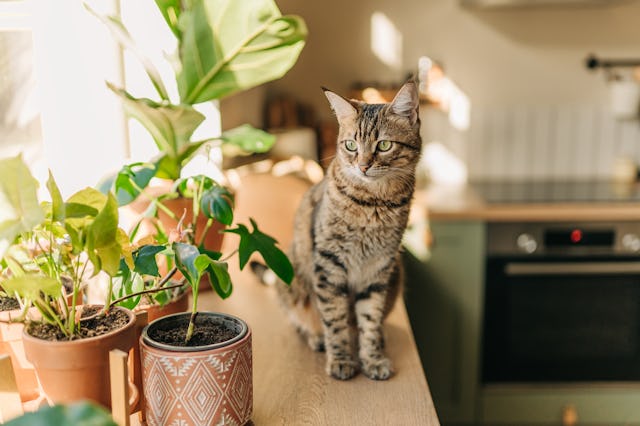If The Family Cat’s A Little Too Comfy On The Counter, A Vet Has Advice For You
A few pro pointers to help deter this natural but pesky (and potentially dangerous) behavior.

When I adopted my cat Olive a couple of years ago, I tried my best to keep her off the countertops. I tried scolding her, and as a nicer tactic, simply taking her off and using treats as positive reinforcement. Of course, all this was in vain. As much as I've tried to rectify her behavior, Olive continues to jump on countertops. Kitchen, bathroom, wherever there's a counter, she wants to be on it. I've now given up and accepted my kitty is a countertop hopper extraordinaire (while also always making sure to have some disinfectant wipes on hand). I know I'm not alone since countertop hopping is a fairly common trait for felines. In fact, data shows that thousands of people every month search "how to keep cats off counters." If you're like me, you've accepted this bad habit — even if you don't like it.
However, it might help to know that this behavior is innate and not just your kitty being flagrantly disobedient. "Climbing and exploring high locations is a normal cat behavior," Dr. Megan McCarthy, a veterinarian at Best Friends Animal Society. "In nature, most cats prefer to climb and explore and can feel safe perched in locations off the ground."
If you want to learn more about why cats jump on countertops, along with some of the most popular methods to keep cats off counters, keep reading.
Why do cats jump on countertops?
In addition to their love of climbing and exploring, cats enjoy having a broader vantage point — they like a “bird’s eye view,” so to speak — mostly to keep themselves safe, but it can also be linked to their hunting nature. Plus, cats are just curious creatures. They want to be where the action is and can’t resist investigating new things.
Are there any dangers for cats being on countertops?
You probably don't love the idea of the same kitty feet that paw through the litter box tromping all over the space you prepare and serve food. As a mom, you're programmed to protect your kids from germs as much as possible. Not to mention, anyone who has ever been awoken in the middle of the night by their cat knocking something off the counter would see that as yet another valid reason not to want your cats milling about up there.
However, you're also probably worried that your cat being on the counters could potentially lead to trouble for your feline friend — and that fear isn't totally unfounded. Yes, cats have a reputation for always landing on their feet, but that's not always the case. "While cats, in general, have very good balance and land on their feet a majority of the time, young kittens or cats with poor balance or other medical conditions may not land on their feet, and it's best to keep these particular cats off high areas," McCarthy says.
According to McCarthy, there are other dangers for cats being on countertops, including getting into toxic human foods or cooking items and getting onto hot stovetops. "Some cleaning solutions used on countertops, such as bleach or Lysol, can also scald their paw pads,” points out McCarthy. “It's also more sanitary for human food preparation if cats are kept off countertops."
What are some tips to keep cats off countertops?
To keep cats off countertops, McCarthy recommends providing appropriate high perches that they are allowed to explore — like a tall cat tree, a window ledge, or other homemade cat perches attached high up on the wall. “Providing cats with these areas are great environmental enrichment for indoor cats,” she says. You can entice cats to climb the appropriate perches and make them more appealing than the countertops. You can use positive reinforcement with treats and catnip on the appropriate perches, while making the counters less appealing.”
She also suggests using tinfoil, parchment paper, or double-sided tape on the counter, explaining, “Cats tend to dislike the feeling of these materials under their paws and will hopefully learn to avoid this area. If these materials on the counter are not working, you may have to resort to using a spray bottle with water to discourage the cat from jumping up on the counters.”
Whatever you do, don’t resort to pushing your cat off the counter. Again, despite the folklore, cats don’t always land on their feet! The last thing you want to do is hurt your family feline.
This article was originally published on